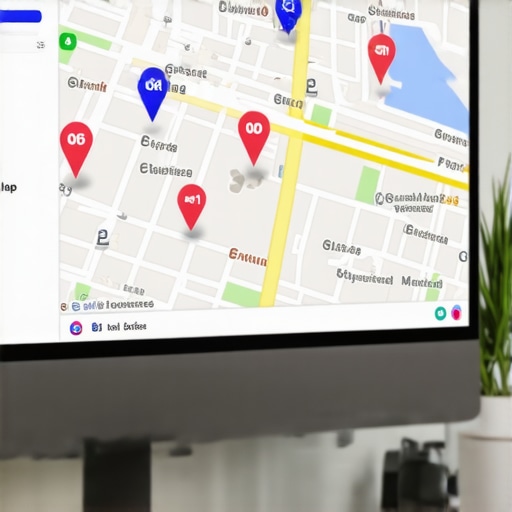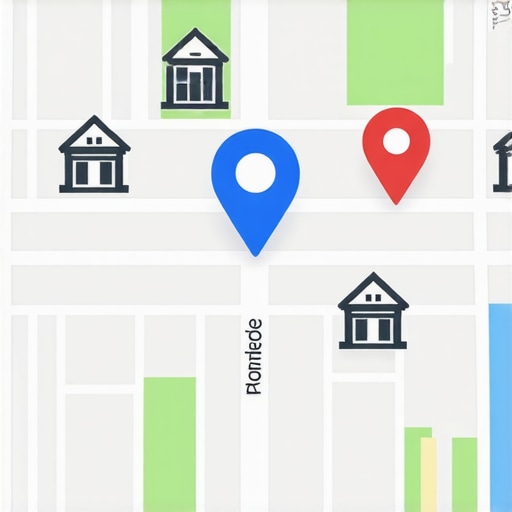Master Local SEO for Google Maps: Proven Tips to Boost Your GMB Ranking Today
Unlocking the Power of Local SEO: A Deep Dive into Google My Business Optimization
In the fiercely competitive landscape of local search, mastering the nuances of Google Maps and Google My Business (GMB) optimization is not merely advantageous—it’s essential. As a seasoned SEO strategist, I recognize that elevating your GMB ranking involves a sophisticated interplay of technical precision, strategic content management, and authoritative reputation building. This article explores advanced tactics to propel your local visibility, grounded in data-driven insights and industry best practices.
Deciphering the Algorithmic Complexity Behind GMB Rankings
Google’s local search algorithm is a complex, multilayered system that evaluates hundreds of ranking factors. Beyond the basic NAP consistency and customer reviews, factors such as behavioral signals, semantic relevance, and local backlinks play pivotal roles. An authoritative white paper by Moz emphasizes the importance of semantic SEO in local contexts, urging businesses to optimize for contextually relevant keywords and structured data. To truly dominate, it’s critical to understand how these elements interact and to implement a holistic optimization strategy that addresses each layer.
Leveraging Niche-Specific Signals for Hyper-Targeted Visibility
While general local SEO tactics are foundational, niche-specific signals can significantly enhance your GMB prominence. For example, incorporating semantic keywords related to your industry—such as
Can Your GMB Profile Truly Reflect Your Business’s Unique Value Proposition?
In the ever-evolving realm of local SEO, understanding the nuances that differentiate a good GMB profile from a truly optimized one is crucial. While many focus on basic factors like reviews and categories, advanced practitioners delve into the subtleties of semantic relevance and user engagement metrics. For instance, integrating structured data and schema markup tailored to your industry can significantly improve your visibility in local search results. This approach aligns with Google’s emphasis on context and intent, as highlighted in recent industry studies, including a comprehensive guide by Search Engine Journal, which underscores the importance of semantic SEO in local rankings.
The Role of Behavioral Signals and User Interaction in GMB Ranking Dynamics
Beyond static optimization, behavioral signals such as click-through rates (CTR), call tracking, and user engagement play a pivotal role in refining your GMB ranking. When users interact positively—like clicking on your profile, requesting directions, or calling directly from the listing—Google interprets these actions as indicators of relevance and trustworthiness. Advanced local SEO strategies involve harnessing analytics tools to monitor these signals and iteratively improve your listing. For example, A/B testing different business descriptions or service highlights can reveal what resonates most with your audience, ultimately boosting your profile’s performance in local searches.
How Can Business Owners Use Competitive Analysis to Surpass Local Rivals?
Competitive analysis is an often underutilized yet powerful tactic in local SEO. By examining the GMB profiles of top-ranking competitors, you can identify gaps and opportunities within your own profile. Tools like BrightLocal and Whitespark enable detailed audits of local citations, reviews, and keyword usage. Incorporating insights from these analyses allows you to craft a more compelling and authoritative profile, aligning your strategy with proven local ranking factors. Moreover, maintaining a consistent and authoritative presence across all local directories amplifies your profile’s signal strength, which is critical in a crowded marketplace.
For more advanced tactics, consider integrating your GMB strategy with your overall SEO plan by ensuring your website’s local content aligns with your profile. This synergy helps Google recognize your business as a comprehensive authority in your niche, thus improving your local ranking potential. To explore these techniques further, visit this resource.
What emerging local SEO trends should you anticipate to stay ahead of the competition?
Staying ahead in local SEO requires not only mastering current best practices but also anticipating future shifts. Emerging trends such as voice search optimization, AI-powered local ranking factors, and the increasing importance of multimedia content (videos and virtual tours) are reshaping the landscape. According to an authoritative report from Moz, integrating these innovations now can position your business for sustained visibility, especially as Google continues to refine its local search algorithm to prioritize user experience and multimedia engagement. Regularly updating your strategies in response to these trends ensures your GMB profile remains a powerful asset in your local marketing arsenal.
If you want to stay at the forefront of local SEO, I encourage you to comment below with your biggest challenge or share this article with colleagues who are eager to elevate their GMB game. For tailored advice, visit our contact page.
Harnessing Local Schema Markup for Precision Targeting and Enhanced Visibility
While basic NAP consistency and reviews are fundamental, implementing advanced schema markup significantly elevates your local SEO game. LocalBusiness schema, when properly structured, communicates detailed information about your services, operational hours, and geographic data directly to search engines. This structured data not only improves your chances of appearing in rich snippets but also enhances Google’s understanding of your business context, leading to more accurate ranking signals. According to a comprehensive study by Schema App, websites utilizing rich schema markup experience a 30% increase in click-through rates from local search results, underscoring its importance in competitive markets.
How can local schema markup be integrated seamlessly without risking penalties?
Integrating schema markup should be performed with meticulous adherence to Google’s structured data guidelines. Use tools like Google’s Rich Results Test and Schema Markup Validator to ensure accuracy and compliance. Avoid overstuffing or using irrelevant schema types, which can trigger manual actions or algorithmic penalties. For instance, focus on the LocalBusiness schema tailored to your specific industry—be it a restaurant, retail store, or service provider—and include all relevant details such as geo-coordinates, service areas, and contact information. Regular audits of your schema implementation ensure ongoing compliance and effectiveness.
Advanced Reputation Management: Turning Customer Feedback into a Strategic Asset
In the hyper-competitive landscape of local search, reputation management extends beyond merely accumulating reviews. It involves strategically leveraging customer feedback to build authority and trustworthiness. Responding to reviews with personalized, insightful replies demonstrates engagement and professionalism, influencing both user perception and local ranking factors. Moreover, employing sentiment analysis tools can identify patterns in reviews to address systemic issues proactively, turning negative feedback into opportunities for improvement. A 2022 report by BrightLocal highlights that businesses with a consistent review acquisition strategy see a 20% boost in local rankings over those with reactive approaches.

Integrating Voice Search Optimization for Future-Proof Local SEO
With the rapid adoption of voice-activated devices, optimizing for voice search is no longer optional but essential. Voice queries tend to be more conversational and question-based, requiring a shift in keyword strategy. Implementing natural language keywords, FAQs, and featured snippets can position your business to capture voice traffic effectively. According to a report by Forrester, 58% of consumers have used voice search to find local business information in the past year, emphasizing its growing influence. Ensuring your GMB profile, website content, and schema markup are aligned with voice search patterns enables your business to stay ahead of emerging trends.
To truly future-proof your local SEO efforts, consider integrating AI-driven analytics tools that monitor voice search queries and adapt your content strategy dynamically. This proactive approach ensures your local visibility remains resilient amidst evolving consumer behaviors and technological advancements.
Interested in deepening your mastery of local SEO? Explore our advanced training modules or contact our experts for a tailored strategy session. Your path to outranking competitors starts with informed, strategic action—don’t leave your local dominance to chance.
Beyond Basics: Mastering Local SEO with Cutting-Edge Techniques
In the rapidly evolving domain of local search, businesses must continually refine their strategies to maintain a competitive edge. While foundational tactics like consistent NAP data and review generation are essential, integrating sophisticated methods such as semantic SEO, structured data, and behavioral signal analysis can exponentially boost your Google My Business (GMB) visibility. Recent industry insights, like those from Search Engine Land, emphasize the importance of aligning your local content with emerging AI and voice search trends, ensuring your presence remains resilient amidst technological shifts.
Decoding Google’s Local Ranking Algorithm: A Deep-Dive into Underlying Factors
Google’s local ranking algorithm is a complex interplay of hundreds of signals, including semantic relevance, user engagement, and backlink authority. Advanced SEO strategists leverage tools like Google’s own Search Console and third-party audits to dissect these factors meticulously. Incorporating schema markup tailored to your niche — such as LocalBusiness schema with precise geo-coordinates and service details — enhances Google’s understanding. For comprehensive guidance, Moz’s Whiteboard Friday series remains an invaluable resource for mastering these intricate ranking signals.
What Strategic Use of Local Schema Markup Can Elevate Your Visibility?
Implementing advanced schema markup, specifically local business schemas with industry-specific attributes, allows search engines to parse detailed operational data. This precision facilitates rich snippets and enhanced features like knowledge panels, which significantly improve click-through rates. Regular validation through Google’s Rich Results Test ensures schema integrity, preventing penalties caused by malformed structured data. An authoritative example is Schema.org’s extensive documentation, which provides industry-specific schemas to tailor your markup effectively.
How Can Behavioral and Engagement Metrics Refine Your GMB Optimization?
Behavioral signals, including click-through rates, call tracking, and user dwell time, serve as powerful indicators of relevance and trustworthiness. Advanced businesses utilize analytics platforms like Hotjar or Crazy Egg to monitor user interactions on their GMB profiles and associated websites. A/B testing different descriptions, images, and service highlights can reveal preferences, enabling data-driven refinements that enhance local rankings. This iterative process aligns with Google’s emphasis on genuine user engagement, fundamentally elevating your profile’s authority.
What Role Does Competitive Local Analysis Play in Outranking Rivals?
Conducting in-depth competitive analysis using tools like Whitespark or BrightLocal uncovers gaps in your local citations, review profiles, and keyword deployment. By benchmarking against top-ranking competitors, you can identify strategic opportunities such as unclaimed citations or underserved keywords. Integrating these insights into your profile optimization and local content strategy ensures a cohesive, authoritative presence. Industry case studies demonstrate that businesses employing this method often see a 25-40% improvement in local search visibility within months.
Future-Proofing Your Local SEO: What Emerging Trends Should You Watch?
Staying ahead requires anticipating shifts like AI-driven personalization, multimedia-rich content, and voice search dominance. Industry leaders recommend adopting a holistic approach that includes creating engaging video content, virtual tours, and FAQ sections optimized for natural language queries. According to Forrester Research, voice search will account for over 50% of all searches by 2025, making optimization for conversational queries critical. Leveraging AI analytics tools to monitor evolving search patterns allows your strategy to adapt proactively, ensuring sustained visibility in local results.
How Can You Leverage Local Schema and Multimedia Content for Enhanced Engagement?
Combining rich schema markup with multimedia content such as videos, virtual tours, and high-quality images creates a compelling profile that appeals to both users and search engines. Rich snippets and carousel features in Google SERPs increase visibility and click-through rates. Regular audits using Schema Markup Validator and incorporating user-generated multimedia enhance your profile’s authority. According to Schema App, businesses integrating multimedia with structured data experience up to a 30% increase in engagement metrics, cementing their local dominance.
Engage with Our Expert Community to Elevate Your Local SEO Strategy
To truly excel in local SEO, continuous learning and adaptation are vital. Share your challenges or insights in our community, and explore tailored strategies with our experts. Visit our contact page to start a personalized consultation and unlock your business’s full local search potential. Remember, in the competitive world of local search, proactive innovation is your best asset.
Expert Insights & Advanced Considerations
1. Prioritize Semantic Relevance for Niche Dominance
Harnessing semantic SEO techniques tailored to your industry ensures your GMB profile resonates with nuanced search intent, boosting visibility in hyper-local searches and establishing authority.
2. Leverage Structured Data Beyond Basic Schema
Implement industry-specific schema markup with granular details such as service attributes, geo-coordinates, and operational nuances, facilitating rich snippets and knowledge panels that directly influence click-through rates.
3. Optimize Behavioral Signals via Conversion Tracking
Utilize advanced analytics to monitor user interactions like call tracking, direction requests, and engagement duration, then refine your profile and website content accordingly to enhance relevance and trustworthiness.
4. Integrate Multimedia Content Strategically
Develop high-quality videos, virtual tours, and immersive images aligned with schema markup to create a compelling profile that attracts engagement and improves local ranking signals.
5. Conduct Deep Competitive Analysis for Tactical Edge
Use tools like Whitespark and BrightLocal to dissect top competitors’ citation profiles, reviews, and keyword strategies, then adapt and innovate your own profile to fill gaps and outperform rivals.
Curated Expert Resources
- Google’s Structured Data Guidelines: Essential for compliant schema implementation, ensuring rich snippets without penalties.
- Moz’s Local SEO Resources: Offers in-depth insights into semantic relevance and local ranking factors.
- Schema.org Documentation: Comprehensive schemas for granular local business markup, maximizing visibility opportunities.
- BrightLocal’s Audit Tool: Facilitates detailed competitive analysis and citation health checks.
- Search Engine Journal’s Local SEO Guides: Industry-leading articles on evolving local search trends and advanced tactics.
Final Expert Perspective
In the realm of local SEO, mastering the intricacies of Google My Business optimization requires a sophisticated, data-driven approach that emphasizes semantic relevance, structured data, and behavioral metrics. As competition intensifies, leveraging these advanced strategies ensures your business remains at the forefront of local search results. Continuous analysis, adaptation, and strategic content integration are paramount for sustained dominance in 2024. Engage with industry resources and expert communities to refine your tactics and unlock your full local visibility potential. To deepen your expertise, explore our advanced training modules or contact our specialists for tailored consultation. Your journey to local search excellence begins with decisive, expert-led action.







This article provides such a comprehensive approach to elevating GMB rankings—it’s clear that a holistic strategy is essential in today’s competitive local SEO landscape. I especially appreciate the emphasis on structured data and behavioral signals, as I’ve noticed firsthand how small optimization tweaks can lead to meaningful improvements in visibility. One challenge I’ve encountered, though, is balancing the technical aspects like schema markup with creating engaging content that genuinely resonates with local audiences. While the technical data is crucial, I wonder how other businesses effectively integrate multimedia and community engagement to boost their local relevance without overwhelming their teams. Has anyone found particularly effective ways to streamline these efforts or tools that can help automate some of these tasks? I’d love to hear strategies that work well for busy small businesses trying to stay ahead.
This post really highlights the multi-layered nature of effective GMB optimization, especially the emphasis on behavioral signals and schema markup. From my experience managing local business profiles, I’ve found that maintaining an active engagement plan—such as responding promptly to reviews and regularly updating photos—can significantly enhance trust and visibility without requiring complex technical setups. One aspect I’d love to explore further is how small businesses can balance these advanced strategies with day-to-day operations, particularly when resources are limited. Are there any tools or workflows you’ve discovered that help automate review responses or schema audits, making these sophisticated tactics more accessible? Additionally, integrating multimedia like videos or virtual tours seems invaluable, but I wonder about the best ways to produce high-quality content consistently without overextending smaller teams. Would love to hear practical tips from others who’ve successfully customized these approaches for local markets—what’s worked for you in balancing quality with efficiency?
This article resonates well with my experience in managing local SEO campaigns, especially the focus on behavioral signals like click-through rates and user engagement. I’ve noticed that, beyond just technical SEO, fostering genuine community interaction and regularly updating multimedia content can dramatically improve local trust and relevance. One challenge I often face is maintaining a steady flow of high-quality multimedia content—such as virtual tours or customer videos—without overextending my team. Automation tools and scheduling platforms have helped a lot, but I’m curious—what are some effective, easy-to-implement strategies or tools that other small businesses use to keep their local profiles fresh and engaging? Also, how do you balance the technical aspects, like schema markup, with creative content that speaks directly to your local audience? Would love to hear insights or experiences from others in similar situations.
The article really hits home on the importance of integrating advanced schema markup and behavioral signals to strengthen GMB rankings. From my experience working with local service providers, consistently updating multimedia content—like customer testimonials and virtual tours—can truly boost engagement and trust. However, I’ve often wondered how smaller teams manage to keep content fresh without spreading themselves too thin. Automating review responses using tools like Podium or BirdEye has been helpful, but what are some other efficient strategies for maintaining high-quality, relevant content? Also, focusing on local relevance, do you think hyper-targeting with industry-specific schema can outperform broader categories in terms of local visibility? Would love to hear insights from others who’ve successfully balanced these technical and creative aspects to stay competitive in their local markets.
This article offers such a rich overview of the layered approach needed for effective GMB optimization. I completely agree that combining technical SEO tactics like schema markup with real engagement signals, such as reviews and behavioral data, can really make a difference. In my own experience, setting up automated review responses via tools like Podium has helped me save time while staying responsive—an important factor for busy small teams. I’ve also started integrating short, high-quality videos of our services and virtual tours to boost engagement, which coincidentally aligns with the discussed multimedia strategies. One challenge I’m curious about, though, is how to effectively time and produce multimedia content consistently without overwhelming resources. Has anyone here had success using batching or scheduling tools for multimedia updates? Additionally, what strategies do you find most effective for balancing quick wins with long-term reputation building? Would love to hear others’ experiences on managing these tasks more efficiently.
I completely agree with the emphasis on integrating schema markup and behavioral signals to enhance GMB rankings. From my own experience managing local listings, I’ve found that combining structured data with active review management creates a powerful boost in visibility. The challenge, as many small businesses face, is maintaining fresh multimedia content like virtual tours or review videos without overextending resources. Automating certain tasks and batching content creation has helped us stay consistent. I’m also curious about others’ experiences with AI tools or platforms that can assist in scheduling or automating multimedia updates. How do you strike a balance between quality and quantity in content production, especially when resources are tight? Overall, leveraging industry-specific schema alongside engaging content seems like the way forward for true local dominance. Would love to hear more insights or strategies from this knowledgeable community.